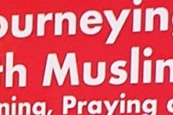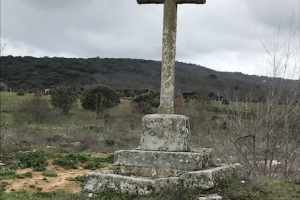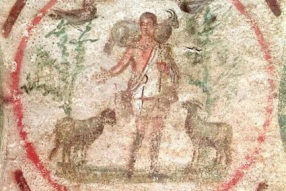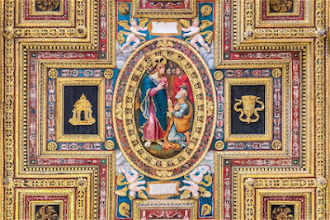Pax Christi Lent Reflection: Where there is friendship and love, there is God
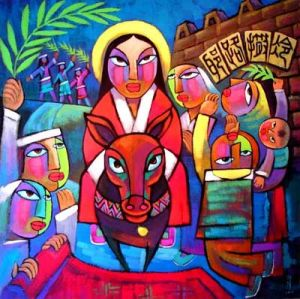
This reflection for Palm/Passion Sunday has been produced by the Senior Policy Advisor of Pax Christi International.
Lk 19:28-40 | Is 50:4-7 | Ps 22 (21) | Phil 2:6-11 | Lk 22:14-23:56
We are at the beginning of Christianity's most impressive week. One in every three people in the world calls him/herself a Christian. To be a part of this family means to stand in a two-thousand year tradition that has left many marks on society - bad as well as good. For centuries, the liturgy of Holy Week has been directed to renewing faith, deepening love and awakening hope.
Serving love
Jesus is welcomed today like a king. He makes his happy entry into Jerusalem. The happy entry gives way to the horrible agony: the Calvary trip to Golgotha, the way of the Cross. Jesus chooses a kingdom of love and not of power. He is a Servant King. We compare the political, economic and other driving forces of our societies to a different kingdom, one based on another set of values, one with a constitution that casts the mighty from their thrones, feeds the hungry, places the poor in the front seat and heals the broken.
Processions are forms of protest
Processions of all shapes, sizes and motivations are part of our human culture. No protest is complete without a procession. Processions may be simple and casual but even these can be very significant, telling what is in the heart of a people. Many members of Pax Christi and other justice and peace groups regularly come together to raise many forms of injustice in silent protest, through processions and silent walks. They are a visual expression of indignation. They are always cries for change and improvement for people and their environment.
In many parts of the world, Passion Plays and processions are being held during Holy Week. In spite of questioning God's existence or of life after death, in spite of all the recent press about child abuse by religious, the story of Christ's suffering, death and resurrection continues to move the hearts of hundreds of millions around the world. The unique story of Christ belongs not only to one denomination or Christian tradition but belongs to the whole of humankind. Churches and denominations are merely the instruments pointing towards Christ.
The story about an innocent victim being subjected to a mock trial resonates because it still happens today. We still cover up the truth, defend our own interests, and deny compensation, lying and cheating. We still discriminate against people, tell half-truths, live by corruption, let jealousy or rivalry stand in the way. You name it, it happens. Human rights are violated in many situations often involving the poor and the innocent. Recent decades have brought us face-to-face with accounts and pictures of unbounded human cruelty and suffering. The savagery of war is rivaled only by the violence of crime in a spiral of destruction that endangers our world.
The core of the Passion story is not to highlight the cruelty of human beings, severe though it be, but rather to recall in faith who suffered and why Jesus went through it all, not only freely but also with a sense of genuine fulfillment.
Identification with actors in the story
We relate to the Passion story because we can identify with the different actors in it:
- Peter: He struggled with his loyalty. Under pressure, many of us find it difficult to choose what is best. Whose interests do we serve? What will be the consequences of our actions? We struggle with values and norms, the choice between a quick fix and escape, as opposed to the long, difficult road of honesty and solidarity.
- Look at the role of women in the Passion. We recognise mothers who have lost their children because of violence. They constantly appeal for truth or alternative ways to resolve conflict. The dedication of women in the midst of conflict demonstrates the existence of the healing and loving hands shown for the sick, the accused or refugees, as well as to the rejected.
- The Passion also highlights the role of the military, those who had to follow orders they themselves did not believe in. The soldiers came to the conclusion that their violence could lead to greater chaos rather than peace, because they knew that a good and innocent man was being brought to an undeserved end.
- We note the actions of the political leaders. They worried about who held the highest rank in the hierarchy. If Jesus claimed to be King, he was dangerous to their "throne". The very thought of leadership from a different set of values was, and still is, seen as a threat, rather than an opportunity for change and self-evaluation.
- Many of us like the environmental aspect of the story. The whole of creation is involved, from the Garden of Olives to sour grapes, from the donkey to a rooster and a lamb. Just as with the birth of Christ, the story about his suffering and death has cosmic proportions; everything is affected by the choice between the destruction or the restoration of life. We may ruin a few palm trees on Palm Sunday, but with the oil from the branches we anoint ourselves for the task of improving the global quality of life.
The Passion story is about you and me
Of course, there is the Suffering Servant himself. Like all innocent victims, he doesn't say much in the longest gospel reading of the year. At this stage in his life he acts rather than speaks. His silent witness becomes a universal language understood by all cultures and races at all times and places.
The Passion story is about you and me. We are called to change things for the better, to right an injustice, to protect the defenceless, to welcome the stranger, to challenge the established, to build peace. We need to end the globalisation of indifference which gives rise to a culture of exclusion in which the poor, marginalised and vulnerable are denied their rights, as well as the opportunities and resources that are available to other members of society. Words are good but that is not enough! Words alone will not produce change. To make change happen, we have to give of ourselves. Action is needed.
The Cross is part of the search for authenticity and credibility. From that Cross we learn about concepts like commitment, reliability, solidarity and trust. In biblical terms this is called Passion; in today's terms, we call it love. When there is love, there is life worth living.
Ubi caritas et amor. Deus ibi est.
Where charity and love are, God is there.
The Passion story invites us to begin Holy Week as an annual retreat for all Christians. We go back to the roots of our faith, and from these roots, we plant a life-giving tree.
The series of Lenten reflections is available at:
www.paxchristi.net/news/lent-livenonviolence-livepeace-40-days/7228



